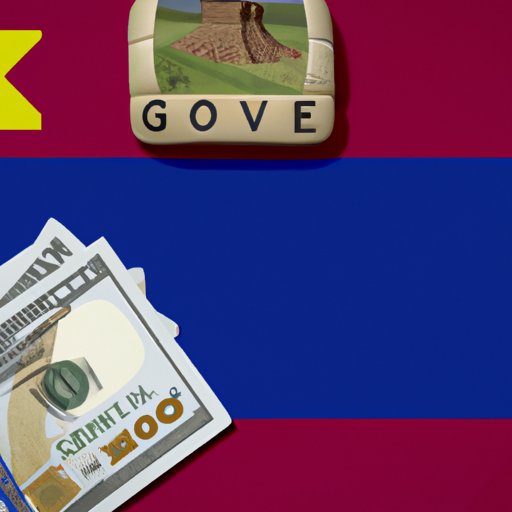Introduction
For many Americans, the image of a bustling casino conjures up images of Las Vegas or Atlantic City. However, one often overlooked part of the gaming industry is tribal gaming. Indian reservation casinos are a unique part of the US gaming landscape, with a complex legal status and a significant impact on local communities. This article seeks to explore the myths and facts surrounding Indian reservation casinos, analyze their economic impact, examine their history and evolution, and critically assess their benefits and drawbacks. Additionally, the article will examine the impact of the COVID-19 pandemic on the tribal gaming industry and consider the long-term outlook for reservation casinos in the United States.

The Legal Status of Casinos on Indian Reservations: Exploring the Myths and Facts
The legal background of Indian reservation casinos is complex. The Indian Gaming Regulatory Act (IGRA) of 1988 established the legal framework for tribal gaming in the United States. Under this law, tribes are given the right to operate casinos on their reservations, provided that they comply with certain regulations. These regulations include maintaining a compact with the state in which the reservation is located and conducting gaming activities that are not prohibited by that state’s laws.
Despite this legal framework, there is still a great deal of confusion surrounding the legality of Indian reservation casinos. One common myth is that all casinos on Indian reservations are exempt from state regulations and taxes. This is not true. In fact, tribes must maintain a compact with the state in which they are located and pay a portion of their gaming profits to the state. Additionally, tribes are subject to a range of federal regulations governing tribal gaming, including rules regarding the operation of gaming machines, the distribution of revenue generated by gaming, and the conduct of gaming activities.

The Economic Impact of Indian Reservation Casinos on Local Communities
While the legal status of Indian reservation casinos is complex, their economic impact is clear. Development of casinos on reservations has brought significant economic benefits to many indigenous communities. According to a report by the National Indian Gaming Association, tribal gaming directly employs over 700,000 people, with an additional 600,000 jobs supported indirectly. Additionally, tribal gaming generates billions of dollars in revenue each year, which has been invested in a range of community development initiatives, including healthcare, education, housing, and infrastructure.
The economic impact of casino development on reservations is not limited to employment and revenue generation. A range of positive spillover effects has been documented, including increased tourism, higher property values, and the development of ancillary businesses such as hotels, restaurants, and retail outlets. Additionally, some experts argue that casinos have the potential to serve as catalysts for broader economic development in indigenous communities and can help to address long-standing social and economic disparities.

The History and Evolution of Indian Reservation Casinos in the United States
The history of Indian reservation casinos in the United States is a complex and often fraught one. Following the passage of the IGRA in 1988, tribes across the country began to develop gaming facilities on their reservations. However, many tribes faced significant challenges from state governments and other groups opposed to the expansion of tribal gaming.
Over the years, tribes have adapted to changing economic and political conditions. For example, many tribes have invested in non-gaming businesses to diversify their revenue streams. Additionally, many tribes have turned to the internet to expand their gaming operations, offering online gaming services to customers in states where such activities are legal.
A Critical Analysis of the Benefits and Drawbacks of Indian Reservation Casinos
While Indian reservation casinos have brought significant economic benefits to many indigenous communities, they are not without their drawbacks. One potential negative effect of casino development is the social and economic cost of gambling addiction. Additionally, there is concern that casinos can exacerbate existing social problems such as crime, addiction, and poverty.
Another issue is the ethical and moral considerations surrounding tribal gaming. Some critics argue that casinos can undermine traditional indigenous values and cultural practices, as well as contribute to the erosion of indigenous sovereignty. Additionally, there is concern that some tribes are overly reliant on gaming revenues and may be tempted to enter into unsavory business deals or engage in unethical conduct to protect their interests.
Examining the Future of Indian Reservation Casinos in a Post-Pandemic World
The COVID-19 pandemic has had a significant impact on the tribal gaming industry. Many casinos have been forced to close for extended periods, leading to significant economic disruption. However, some tribes have been able to adapt to the new realities of the pandemic by implementing new safety protocols and investing in online gaming platforms.
Looking to the future, the long-term outlook for Indian reservation casinos is uncertain. While the pandemic has caused significant disruption, many experts believe that the industry will rebound in the years to come. However, there are also concerns that future economic and political conditions may present significant challenges for tribes operating gaming facilities.
Conclusion
Indian reservation casinos are a unique and complex part of the US gaming industry. While the legal status of these casinos is often misunderstood, their economic impact is significant, with positive spillover effects extending well beyond the gaming industry. However, reservation casinos are not without their drawbacks, and there are legitimate concerns about the social and moral implications of tribal gaming. Looking to the future, the long-term outlook for Indian reservation casinos is uncertain, but many experts believe that the industry will continue to evolve and adapt to changing conditions.
